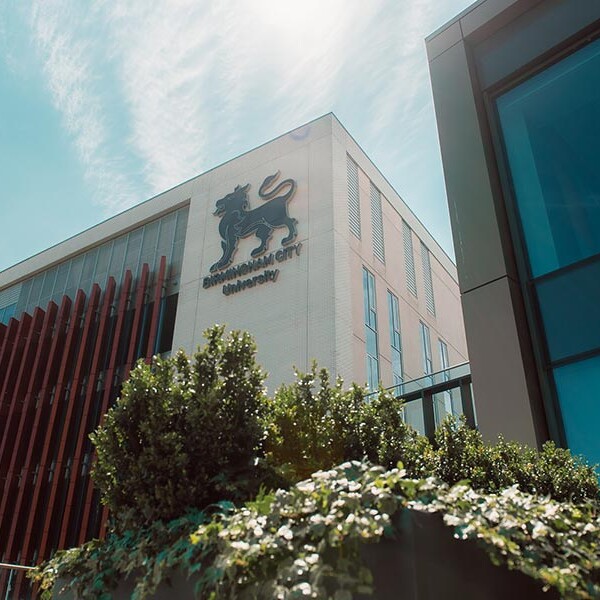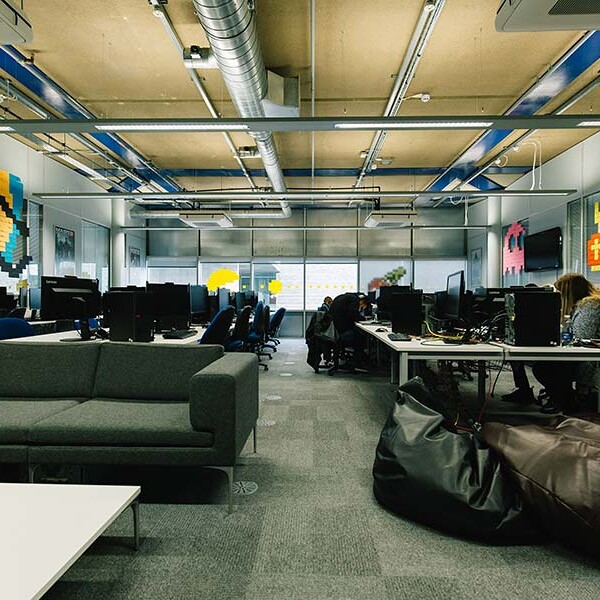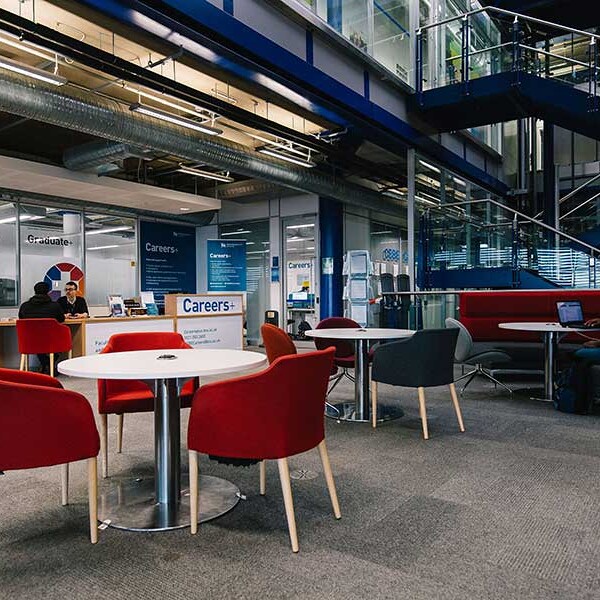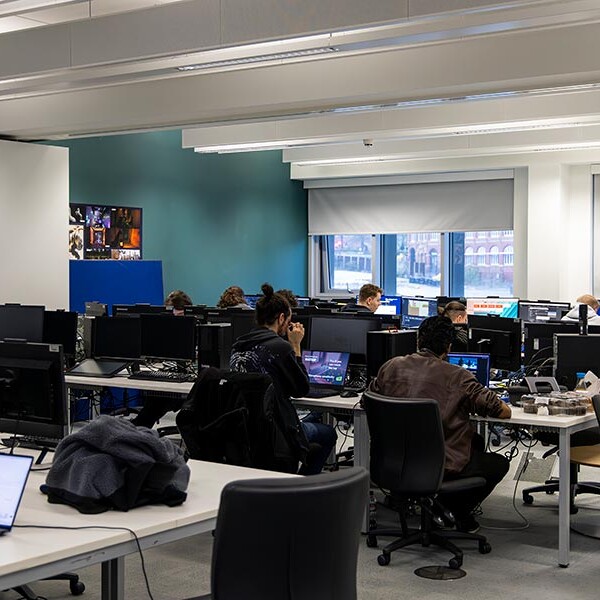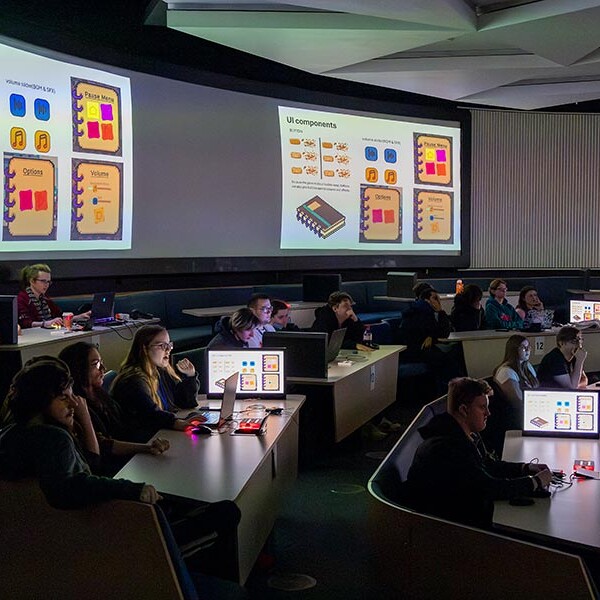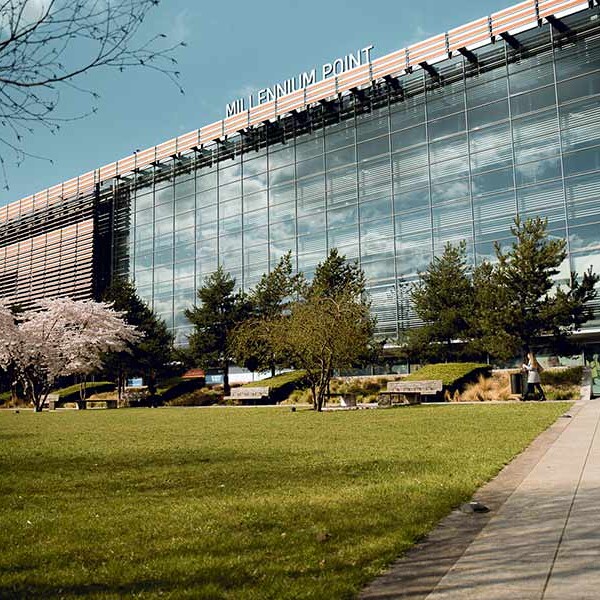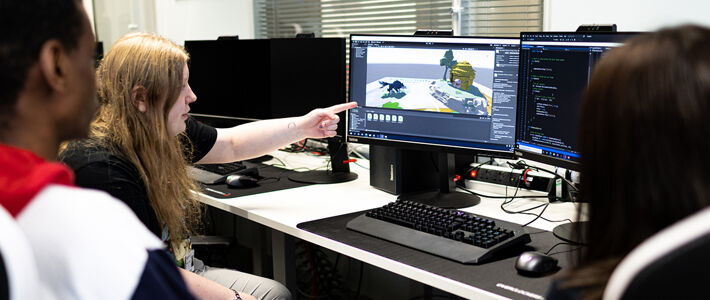
Game Technology - BSc (Hons)
Currently viewing course to start in 2025/26 Entry.
Embark on a journey to the forefront of game technology with our BSc (Hons) Game Technology. This course dives deep into the mechanics of game engines, networked gaming, and emerging technologies. Benefit from hands-on experience in our state-of-the-art labs, featuring industry-standard tools and equipment....
- Level Undergraduate
- Study mode Full Time
- Award BSc (Hons)
- Start date September 2025
- Fees View course fees
- Subjects
- Location City Centre
This course is:
Available with Professional Placement year
Open to International Students
Overview
At BCU we offer a range of games related degrees developed with modern technologies in mind to keep up with the fast-paced gaming industry. Our courses evolve alongside industry trends ensuring you stay ahead of the game.
Located in the heart of Birmingham at our city centre campus our courses are led by industry professionals and experts who help you push the limits of your talents and create things you didn't think possible teaching you in our state-of-the-art facilities.
We offer games courses in technology, programming, design and technical art and all courses share a common first year to provide them with the shared knowledge and the opportunity to specialise in their preferred area in years two and three.
Our students have gone on to work for AAA game titles such as Call of Duty. If you aspire to create immersive worlds, to captivating narratives, groundbreaking gameplay mechanics or even virtual replicas of our campus, BCU is the place for you.
Embark on a journey to the forefront of game technology with our BSc (Hons) Game Technology. This course dives deep into the mechanics of game engines, networked gaming, and emerging technologies. Benefit from hands-on experience in our state-of-the-art labs, featuring industry-standard tools and equipment.
You will work with experts and peers to develop games that push the boundaries of technology and creativity. You’ll also have the chance to explore new realms like cloud gaming and procedural content generation. Prepare to launch your career with a solid foundation in both the technical and creative aspects of game technology.
Our labs are equipped with the latest in game development technology, including advanced graphics workstations, network simulation tools, and game testing environments. You will gain practical experience with both software and hardware tools crucial for modern game development.
Collaborations with major tech companies and game studios offer you insights into the industry’s best practices and emerging trends. These partnerships not only provide access to professional-grade software and hardware but also create pathways for internships and mentorships, enriching your educational experience with real-world perspectives and hands-on opportunities.

Introducing STEAMhouse
STEAMhouse is a centre for technology, innovation, creative thinking, prototyping and business development. Our £70 million pound building is the home for all of our Computing courses.
What's covered in this course?
- Learn core game development skills through foundational and advanced game programming, including AI implementation and physics engines.
- Explore interactive media design principles for creating engaging user interfaces and game experiences.
- Develop skills in Virtual, Augmented and Extended Reality technologies to create immersive environments.
- Understand software engineering practices via exposure to lifecycle, version control, and testing methodologies relevant to game development.
- Participate in collaborative and interdisciplinary team projects that simulate real-world game studio environments.
- Gain insights from guest lectures and live briefs in partnership with leading game technology companies.
Professional Placement Year
This course offers an optional professional placement year. This allows you to spend a whole year with an employer, following successful completion of your second year, and is a great way to find out more about your chosen career. Some students even return to the same employers after completing their studies.
If you choose to pursue a placement year, you will need to find a suitable placement to complement your chosen area of study. You will be able to draw on the University’s extensive network of local, regional, and national employers, and the support of our Careers teams. If you are able to secure a placement, you can request to be transferred to the placement version of the course.
Please note that fees are payable during your placement year, equivalent to 20% of the total full-time course fee for that year.
The state-of-the-art hardware and software combined with astounding teaching, has fast tracked my games development skills, I am now going into my second year with an independently published title.
Nadia Nadeem
Why Choose Us?
- Access to developer kits - We are proud to be one of the first universities that can offer access to developer mode or dev kits from the three major video game platforms - PlayStation, Xbox and Nintendo.
- We work in partnership with Unity and Unreal - This means that we have met strict standards of excellence and are authorised to offer training courses and Unity Certification Exams on behalf of Unity Technologies.
- State-of-the-art facilities - Our computing facilities include a dedicated computer games development lab which houses high specification game development PCs, VR and AR headsets, and gaming peripherals.
- BCU are winners of Excellence in Games Research Award at the TIGA UK Games Education Awards 2024, 'best educational initiative and talent development' at the TIGA Games Industry Awards 2023 and the Innovative Teaching Award at the TIGA Games Education Award 2023.
- Ranked in the top 5 in the UK for animation and games design (Guardian League Table 2024).
- You are given the opportunity to collaborate with students from other disciplines within the University and external companies, such as our recent Fashion Police project with Fashion students and the West Midlands Police Museum.
Open Days
Join us for an Open Day where you'll be able to learn about this course in detail, chat to students, explore our campus and tour accommodation. Booking isn't open for this event yet, register your interest and we'll let you know as soon as booking goes live.
Next Open Day: 28 June 2025
Entry Requirements
These entry requirements apply for entry in 2025/26.
All required qualifications/grades must have been achieved and evidenced at the earliest opportunity after accepting an offer to help confirm admission and allow for on-time enrolment. This can also include other requirements, like a fee status form and relevant documents. Applicants can track their application and outstanding information requests through their BCU mySRS account.
Essential requirements
- Standard offer: 112 UCAS Tariff points. Learn more about UCAS Tariff points.
- Accelerate offer: 80 UCAS Tariff points. Find out more about BCU Accelerate.
If you have a qualification that is not listed, please contact us.
Fees & How to Apply
UK students
Annual and modular tuition fees shown are applicable to the first year of study. The University reserves the right to increase fees for subsequent years of study in line with increases in inflation (capped at 5%) or to reflect changes in Government funding policies or changes agreed by Parliament. View fees for continuing students.
Award: BSc (Hons)
Starting: Sep 2025
- Mode
- Duration
- Fees
- Full Time
- 3 years
- £9,535 in 2025/26 ✱ Important note for this price
- Apply via UCAS
(↩Back to price) * The Government is proposing to increase the cap on full-time regulated tuition fees to £9,535 for 2025/26 and the University is planning on increasing fees to that maximum level once legislation is enacted. Part-time fees are charged pro-rata, where applicable.
International students
Annual and modular tuition fees shown are applicable to the first year of study. The University reserves the right to increase fees for subsequent years of study in line with increases in inflation (capped at 5%) or to reflect changes in Government funding policies or changes agreed by Parliament. View fees for continuing students.
Award: BSc (Hons)
Starting: Sep 2025
- Mode
- Duration
- Fees
- Full Time
- 3 years
- £17,690 in 2025/26
Guidance for UK students
UK students applying for most undergraduate degree courses in the UK will need to apply through UCAS.
The Universities and Colleges Admissions Service (UCAS) is a UK organisation responsible for managing applications to university and college.
Applying through UCAS
- Register with UCAS
- Login to UCAS and complete your details
- Select your course and write a personal statement
- Get a reference
- Pay your application fee and submit your application
Guidance for International students
There are three ways to apply:
1) Direct to the University
You will need to complete our International Application Form and Equal Opportunities Form, and submit them together with scan copies of your original academic transcripts and certificates.
2) Through a country representative
Our in-country representatives can help you make your application and apply for a visa. They can also offer advice on travel, living in the UK and studying abroad.
3) Through UCAS
If you are applying for an undergraduate degree or a Higher National Diploma (HND), you can apply through the UK’s Universities and Colleges Admissions Service (UCAS).
You can request a printed form from your school or nearest British Council office. You will be charged for applying through UCAS. Birmingham City University’s UCAS code is B25 BCITY.
Personal statement
UK / EU students are required to submit a personal statement as part of their application for this course.*
The personal statement gives you a crucial opportunity to say why you’re applying and why the institution should accept you.
Here are the key areas you’ll need to address:
- Course choice - Why does this course appeal? What areas are of particular interest?
- Career plans - If you have a specific career in mind, say how your chosen course will help you pursue this goal.
- Work experience - Mention any work that is relevant to your subject, highlighting the skills and experience gained.
- School or college experience - Highlight skills gained at school/college, eg summer schools or mentoring activities.
- Non-accredited skills or achievement - eg Duke of Edinburgh Award, Young Enterprise scheme.
You should also mention your future plans – if you’re planning to take a year out, don't forget to give your reasons. Talk about any subjects you’re studying that don’t have a formal assessment and any sponsorships or placements you’ve applied for. And don't be scared to add in details about your social, sports or leisure interests.
Worried about Personal Statements?
If you've got no idea where to start or just want to check you're on the right track, we’ve got expert advice and real examples from our students to help you nail your personal statement. You can even download our ultimate personal statement guide for free.
*Non-EU students are not required to submit a personal statement when applying for this course.
Course in Depth
Year 1
In order to complete this course a student must successfully complete all the following CORE modules (totalling 120 credits):
This foundational module introduces you to the essential programming languages and tools needed for game development. Over the course of the semester, you will learn through a series of practical assignments and projects that challenge you to apply coding principles to create basic game functionalities.
Focusing on the creation and manipulation of 3D game assets, this module equips you with skills in using industry-standard 3D modelling software. Through hands-on workshops and guided tutorials, you will learn the techniques of modelling, texturing, and lighting, essential for building visually appealing game environments and characters. The module promotes not only technical skills but also artistic insight, critical for professional game development.
This module explores the technical aspects of creating and managing game assets efficiently. You will engage with the processes involved in asset integration, from initial design to implementation in game engines. Emphasis is placed on workflow efficiency, version control, and collaboration within teams, reflecting the real-world practices of game development studios.
Understanding and implementing core game mechanics are crucial for any game developer. This module provides a deep dive into the rules and systems that drive game play. You will learn to design and program compelling game mechanics using scripting and visual scripting within popular game engines, ensuring engaging player experiences.
In this module, you'll learn the principles of animation that bring game characters and objects to life. Practical sessions cover a range of animation techniques from keyframing to motion capture application. The focus is on creating smooth and responsive animations that enhance the storytelling and aesthetic value of games.
This module introduces the theories and principles of game design. Through project-based learning, you will develop games that incorporate effective design strategies, learning to balance creativity with player engagement. Topics covered include level design, narrative development, and user interface design, all critical to producing well-rounded game experiences.
Year 2
In order to complete this course a student must successfully complete all the following CORE modules (totalling 120 credits):
Dive into the principles of user interface (UI) design and user experience (UX) scripting, focusing on creating intuitive and player-centric interfaces for games. Learn to implement dynamic UI elements and scripts that enhance gameplay and player interaction.
Focusing on the growing sector of mobile and web-based games, this module introduces you to the skills needed to develop games for these platforms. You'll learn about responsive design, cross-platform development, and user interface considerations unique to mobile and web environments. Practical projects will have you apply these skills to create engaging and functional games that operate across different devices.
In this module, you'll experience the environment of a professional game studio. Working in teams, you will develop a game from concept to completion, mimicking the collaborative and iterative processes of real-world game development. This module emphasises project management skills, teamwork, and the integration of various game development disciplines.
Learn the art of crafting immersive game worlds. This module focuses on narrative techniques, environment design, and lore creation, providing you with the tools to build compelling and coherent game universes that captivate players.
Engage with cutting-edge VR and AR technologies. This module teaches you to design and develop immersive experiences using the latest hardware and software, pushing the boundaries of what is possible in game technology.
Building on teamwork skills, this module challenges you to work with peers from different specialisations within the game development field. You'll engage in projects that require collaborative planning and execution, reflecting the interdisciplinary nature of the industry. This module is designed to improve your communication skills, adaptability, and ability to work effectively in diverse teams.
Year 3
In order to complete this course a student must successfully complete all the following CORE modules (totalling 120 credits):
This module focuses on the integration of artificial intelligence in games. You will learn about AI techniques such as pathfinding, decision-making, and machine learning, and how they can be applied to create intelligent behaviours in game characters and environments. The coursework involves practical AI programming tasks that will challenge you to implement these concepts in real game scenarios.
This module delves into the innovative field of virtual production, a technique that blends animation, CGI, and live-action footage. You'll learn to utilise game engine technologies to create real-time, interactive scenes and characters that can be integrated into both games and film. This covers motion capture, real-time lighting and rendering, and virtual cinematography.
Game Audio provides an overview of the technical and creative aspects of audio in game design. Students will engage with sound synthesis, audio asset creation, and the implementation of dynamic and procedural audio systems within game engines. You'll also explore spatial audio and learn to manage audio resources efficiently. This module aims to cultivate a deep understanding of how sound influences user experience and gameplay, arming students with the skills to become proficient audio designers and engineers in the gaming industry.
This module is dedicated to the specific challenges and opportunities of developing games for console platforms. You will learn about the technical requirements, development tools, and performance optimisation techniques specific to consoles. Projects will focus on leveraging console hardware features to enhance game functionality and player experience.
The Individual Honours Project is a capstone module that allows you to demonstrate the skills and knowledge you have acquired throughout the course. You will undertake a substantial independent project that involves researching, designing, and developing a novel project. This is an opportunity to showcase your creativity, technical ability, and understanding of professional game development practices.
Download course specification
Download nowIn the BSc (Hons) Game Technology course at Birmingham City University, you'll embark on a comprehensive journey into the field of game development, designed to foster both your creative talents and technical expertise. Our curriculum is strategically crafted to provide you with a deep understanding of both the theoretical and practical aspects of game technology.
Level four
Your initial year introduces you to the fundamentals of game technology. You will explore essential topics such as basic game programming, interactive media design, and the development of digital assets. This foundation is crucial for mastering the technical skills needed in game creation. Practical workshops and lab sessions allow you to apply theoretical knowledge to real-world projects, setting the stage for more complex challenges.
Level five
The second year deepens your technical skills with advanced modules focused on software engineering practices, virtual and augmented reality, and mobile game development. Emphasis is placed on collaborative projects that replicate professional game development environments, enhancing your ability to work effectively in teams.
Level six
Your final year serves as a launchpad to the industry. It includes an Individual Honours Project, where you can showcase your innovation and technical prowess by developing a comprehensive technology project. This year also features advanced topics such as AI in games and optimisation techniques, preparing you for professional roles and challenges within the tech industry.
Throughout the course, active engagement with all learning activities is encouraged, ranging from lectures and practical workshops to peer learning and self-directed research. This dynamic approach ensures you not only grasp the core concepts of game programming but also excel in applying this knowledge in various professional contexts.
Further studies
You could progress onto a range of postgraduate studies, including an MSc or PGCE. You could also potentially go straight to doctoral research study.
The MSc User Experience Design programme at STEAMhouse is a popular choice among graduating students.
Employability
In the BSc (Hons) Game Technology course at Birmingham City University, we prioritise equipping you with a robust set of skills tailored to enhance your future employability in the fast-evolving gaming industry. Here's how we prepare you to be a highly competent professional in game development:
Develop Your Own Practice
You will learn to refine your programming and design practices through advanced modules and real-world project experiences. This training enables you to critically analyse your work in relation to industry standards and future employment opportunities.
Link Theory to Practice
Our curriculum bridges theoretical knowledge with practical application, allowing you to develop a unique professional identity. You'll understand how various theories underpin the technical aspects of game development, enhancing your ability to innovate and solve complex problems.
Professional Standards in Presentation and Collaboration
You will gain experience in negotiating, planning, and presenting projects to a professional standard. The course emphasises the importance of working effectively both independently and as part of a team, preparing you for the collaborative nature of the gaming industry.
Develop a Broad Skill Set
The course covers a wide array of technical skills, from AI programming and network programming for multiplayer games to console game development and mobile game applications. This diverse skill set ensures you can adapt to various roles within the industry.
Professional Practice Guidance
To further enhance your career readiness, we provide guidance on CV writing, utilising social media for professional networking, and promoting your work effectively using various digital platforms. You will also learn to present your projects and ideas professionally, using advanced communication tools and presentation software.
Through this approach, you will emerge from the BSc (Hons) Game Technology course not only as a skilled game developer but also as a well-rounded professional ready to thrive in the global gaming industry and associated sectors.
The BSc (Hons) Game Technology course at Birmingham City University boasts robust links with the gaming industry, both domestically and internationally. These connections not only enhance the learning experience but also offer valuable work experience opportunities for our students. Through these industry partnerships, students gain practical insights and direct exposure to real-world scenarios, which significantly enrich their academic journey and professional growth.
Regional Partnerships: We collaborate closely with local game studios, heritage centres and tech companies, providing students with internships and project opportunities right at the heart of the UK's gaming hub. These relationships enable students to work on commercial titles and engage with cutting-edge game development processes.
National Links: Our national connections extend to major players in the industry, such as TIGA. These partnerships facilitate guest lectures, professional mentorships, and an industry informed curriculum, giving students a broader perspective of the gaming landscape across the UK.
International Collaborations: Internationally, we have established partnerships with game development companies, such as Unity’s Academic Alliance and Unreal’s Academic Partnership schemes. These links offer students the chance to participate in personal development programs, and skills webinars relevant to their career journeys. We also host Global competitions such as the Global Game Jam, enhancing portfolio opportunities.
These industry links are instrumental in ensuring that our curriculum remains current and aligned with industry standards, while also preparing graduates to transition seamlessly into professional roles in the gaming industry and beyond. They reinforce a practical learning environment that emphasises real-world relevance and equips students with the skills necessary to excel in a competitive global market.
Placements
The BSc (Hons) Game Technology course at Birmingham City University includes an enriching placement year, offering a unique opportunity to gain invaluable industry experience.
This optional placement significantly enhances your employability and professional network. Students have worked with leading gaming companies such as Rare on Sea of Thieves, Double Eleven on Minecraft Dungeons, and Rebellion on Evil Genius 2, with more recent placements at Bulkhead Interactive.
These placements allow you to apply your academic knowledge in professional settings, develop practical skills, and learn from seasoned professionals. This direct industry engagement is instrumental in deepening your understanding of game development and enhancing your career prospects, making our graduates highly desirable in the competitive gaming industry.
Facilities & Staff
At Birmingham City University, the BSc (Hons) Game Technology course boasts cutting-edge facilities designed to mimic a professional game development environment. Our labs are outfitted with high-performance PCs and industry-standard software like Unity and Unreal Engine, ensuring students can tackle game projects with the tools used in top studios.
Motion Capture (Mocap) Labs: A key feature is our mocap lab, which allows students to create realistic animations by capturing real-world movements, vital for developing dynamic game characters and environments.
Texture Creation and Photogrammetry Equipment: Students access high-quality cameras and scanning equipment for texture creation, essential for crafting detailed game visuals. Our photogrammetry tools enable precise 3D modelling of real-world objects, greatly enhancing game realism.
VR and AR Development Kits: We provide resources like Oculus Quest, HTC Vive, and Microsoft HoloLens, enabling students to develop and test pioneering VR and AR experiences.
Dedicated Game Studios: Our studio and project spaces enable a collaborative atmosphere where students can cultivate teamwork and creativity, crucial for successful game design and production.
Our Facilities
We are constantly investing in our estate and are currently in the process of spending £260 million on new learning facilities. This course will be taught at Millennium Point at the City Centre Campus.
The course is supported with a wide range of cutting-edge facilities in the City Centre Campus. We have a state-of-the-art computer games technology lab which contains high-performance PCs, Sony PlayStation development kits and a range of industry standard software including Unity, Unreal and a suite of professional Microsoft development tools.
We also have many open access areas where students can study together and even hire out laptops for use in these spaces and others within the university.
Within the University there are many internationally recognised research teams giving you the opportunity to collaborate with them on exciting interdisciplinary projects.
Computer networking
The laboratories are well-equipped for all our computer networking courses, as well as specialist areas for practical work such as voice-over internet protocol (VoIP), forensic and ethical hacking technologies, wireless and mobile technologies and radio frequency identification technologies to name but a few.
Software development and computer programming
There are a number of open access, software development and computer programming laboratories that can be used to develop systems and programmes, including database management systems such as MySQL, to name but a few.
Systems laboratories
Our embedded systems laboratories are used to develop real-time systems, such as specialist hardware training and development resources, and industrial-standard software development and simulation tools. These include microcontroller software and robotics design and development, to name but a few.
Electronic systems
To underpin the basic principles of electronic systems, we have a well-equipped laboratory of general and specialist test and measurement kits, including powered prototyping development boards, dual power supplies, frequency generators and counters and digital multi-meters to name but a few.
Forensic computing
Our successful development of forensic computing has led to a specialist forensics laboratory that is fully equipped with essential hardware and software for this sensitive area of study. The laboratory includes high-spec PCs with built-in multi interface Tableau write blockers, EnCase and FTK computer forensic software and steganography detection and analysis software, to name but a few.
Our staff
Nathan Dewell
Course Leader – BSc (Hons) Game Technology
Nathan is course leader for BSc (Hons) Game Technology. He teaches Game Studio Production and Game Asset Pipeline. He is part of the research arm for Games and Graphics within the DMTLab at BCU.
More about NathanDr Xi Guo
Senior Lecturer in Computer Games Technology
Dr Xi Guo is Senior Lecturer in Computer Games Technology, and she leads the Web Game Development and 3D Game Programming modules. Since joining the College of Computing in 2020, Dr. Guo has worked as a STEAM academic who provides consultancy and assistance to innovative businesses. Dr. Xi Guo has also been involved in securing funding for various...
More about XiZuby Ahmed
Programme & Creative Director Video Game Design & Production
Zuby is a seasoned game developer and manager, with a career spanning over 20 years, 15 years of which have been focused within the Games Industry. Starting as a freelance writer for Edge, Zuby went onto work for Digital Image Design, Warthog Games, and EA Games.
More about ZubyMathew Randall
Senior Lecturer
Dr Mathew Randall is a Senior Lecturer at Birmingham City University in the UK, where he lectures in visual effects and computer graphics. He is a member of the Graphics and Vision Research group, specializing in real-time analysis and manipulation of motion captured performances and applications of virtual production technology. He is a senior...
More about Mathew

